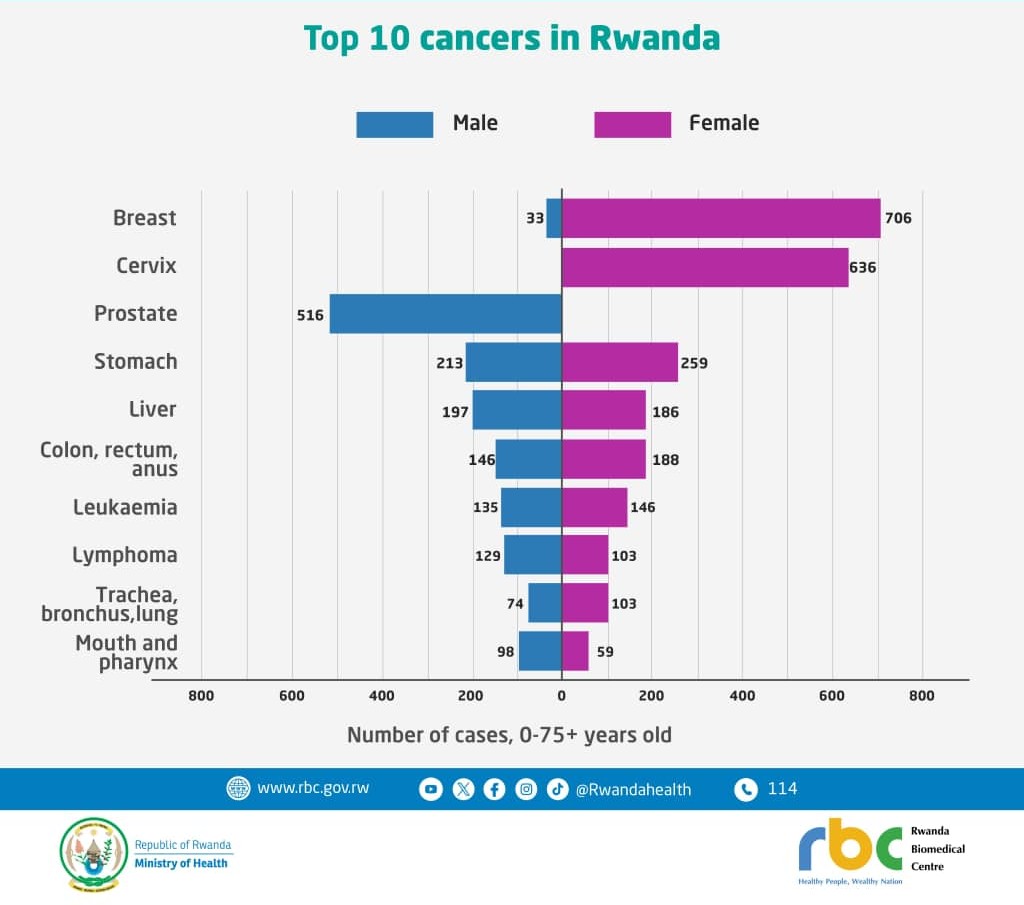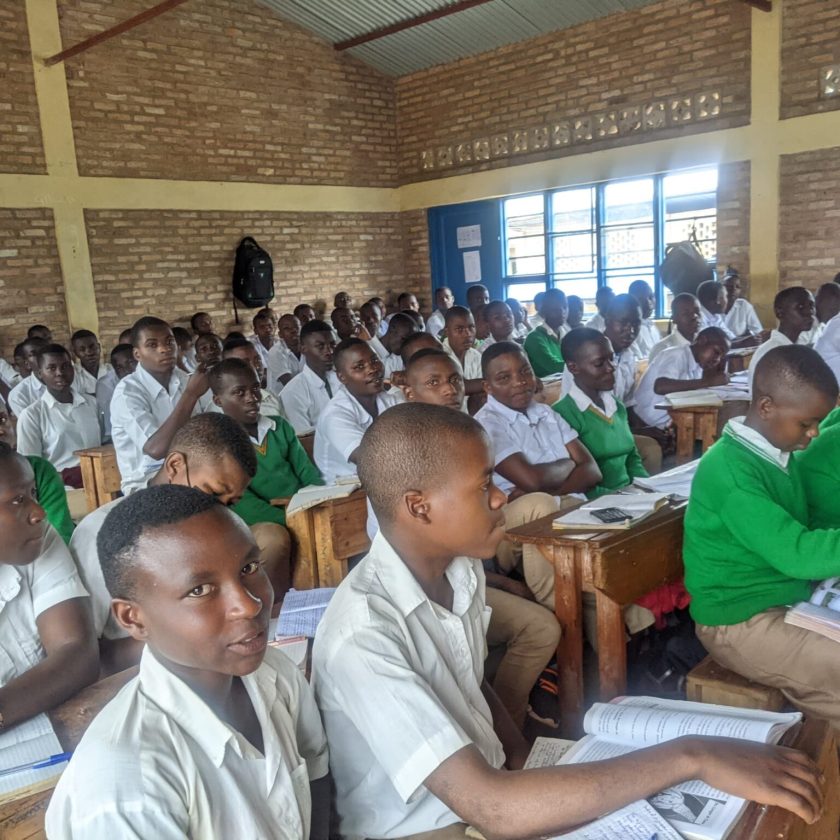In recent years, Rwanda has witnessed a troubling increase in cervical cancer cases, a condition that has become one of the leading causes of cancer related deaths among women.
Despite advancements in healthcare, the rising number of cases has sparked concern across the country, urging authorities, healthcare professionals and the public to take urgent action.
This article delves into the causes behind the increase in cervical cancer in Rwanda, explores its impact on women and their families, and discusses what can be done to prevent the disease.
Through personal testimonies, insights from health experts, we uncover the complexities surrounding this health crisis and the ways forward in tackling it.
The causes behind the increase in cervical cancer
According to health experts, cervical cancer, a disease that primarily affects women, is caused by the human papillomavirus (HPV), which is transmitted through sexual contact.
Rwanda, like many other countries in Sub-Saharan Africa, is grappling with several factors contributing to the alarming rise in cases of cervical cancer because of Lack of Early Detection and Screening: One of the main reasons for the increase in cervical cancer cases is the lack of widespread screening and early detection programs. Many women are unaware of the need for regular pap smears or HPV tests, leading to late-stage diagnoses when treatment options are more limited.
Testimonies
Cervical cancer has a profound impact on the lives of those affected, as evidenced by the following testimony from Mukarutesi Agnes, a 42-year-old mother of three who was diagnosed with cervical cancer:
“I never thought that I would be one of the many women suffering from this disease. I felt constant pain and discomfort, but it was only when I went for a check-up that I was told I had cervical cancer. By the time I was diagnosed, it was already in an advanced stage. If I had known earlier, maybe I could have prevented it. I want other women to understand the importance of regular check-ups.”
Mukarutesi’s story is not an isolated case. Many women in Rwanda, particularly those in rural areas, face similar struggles. For Kantengwa, a 50-year-old woman, the diagnosis came as a shock:
“I was always focused on taking care of my family, and I never thought about my health. However, when I was diagnosed with cervical cancer, it was too late for early treatment. I lost my job and my health deteriorated. If there were more awareness and better access to screenings, things might have been different for me.”
Expert insights: What can be done to prevent cervical cancer?
To better understand the ways to address the rising cases of cervical cancer in Rwanda, we spoke to two international experts Dr. Sophia Martin, an oncologist from the United States, and Dr. Pierre Dubois, a public health expert from France who both emphasized the importance of prevention and early detection.
Dr. Sophia Martin, a renowned oncologist at the National Cancer Institute in the U.S., discussed how global health programs are effectively addressing cervical cancer in developing countries: “Cervical cancer is entirely preventable. The most effective preventive measure is the vaccination against HPV, which protects young girls before they become sexually active. In countries like Rwanda, it is crucial to not only focus on vaccination but also to ensure that women receive regular screenings. Pap smears and HPV tests can detect precancerous changes before they develop into cancer.”
Dr. Martin also highlighted the significant impact of education campaigns, saying, “Awareness is key. Many women in Rwanda, especially in rural areas, do not fully understand the risks of cervical cancer or the importance of early detection. Governments and NGOs must work together to educate women about preventive measures.”
Dr. Pierre Dubois, a public health expert based in France and a leading advocate for cancer prevention in low-income countries, echoed similar views: “We have seen tremendous progress in Europe, where early detection, vaccination, and public health campaigns have significantly reduced cervical cancer rates. Rwanda is on the right track with its HPV vaccination program for young girls, but there is still work to be done. Ensuring that women have access to screenings and healthcare services is a major challenge in rural areas.”
Dr. Dubois stressed the importance of improving healthcare access, particularly for underserved communities, and recommended mobile health units to reach remote areas. “Health education should also extend to men, as HPV is transmitted through sexual contact. This way, communities can work together to reduce the spread of the virus.”
The way forward: What needs to be done?
Cervical cancer in Rwanda is a public health crisis that requires immediate action from all sectors of society. While the government and health professionals are making strides toward addressing the issue, there is still much to be done:
Increase Awareness: Education campaigns are needed to raise awareness about the importance of regular screenings, the availability of the HPV vaccine, and the early signs of cervical cancer. These campaigns should be tailored to reach rural communities where access to information is limited.
Expand Healthcare Access: There is a pressing need to expand healthcare infrastructure, particularly in rural areas, to ensure that women have access to screenings, vaccinations, and treatment. Mobile health units and outreach programs could help bring services to underserved areas.
Strengthen HPV Vaccination Programs: Ensuring that all girls, especially in rural areas, receive the HPV vaccine will help reduce the future burden of cervical cancer. The government must continue to invest in the availability and distribution of vaccines.
Improve Early Detection: Encouraging women to undergo regular screening through public health campaigns and making screening more affordable and accessible will be key to early detection and prevention.
Cervical cancer is a major health challenge in Rwanda, but it is not insurmountable. Through early detection, vaccination, and education, many lives can be saved.
As Rwanda continues to tackle this issue, it is crucial for the government, healthcare professionals, and the public to work together to reduce the impact of cervical cancer on women’s health and ensure a healthier future for all.
The testimonies of women like Mukarutesi and Kantengwa serve as a stark reminder of the urgency of this issue, and they reinforce the need for immediate action to protect the women of Rwanda.
BY KAYITESI Ange





